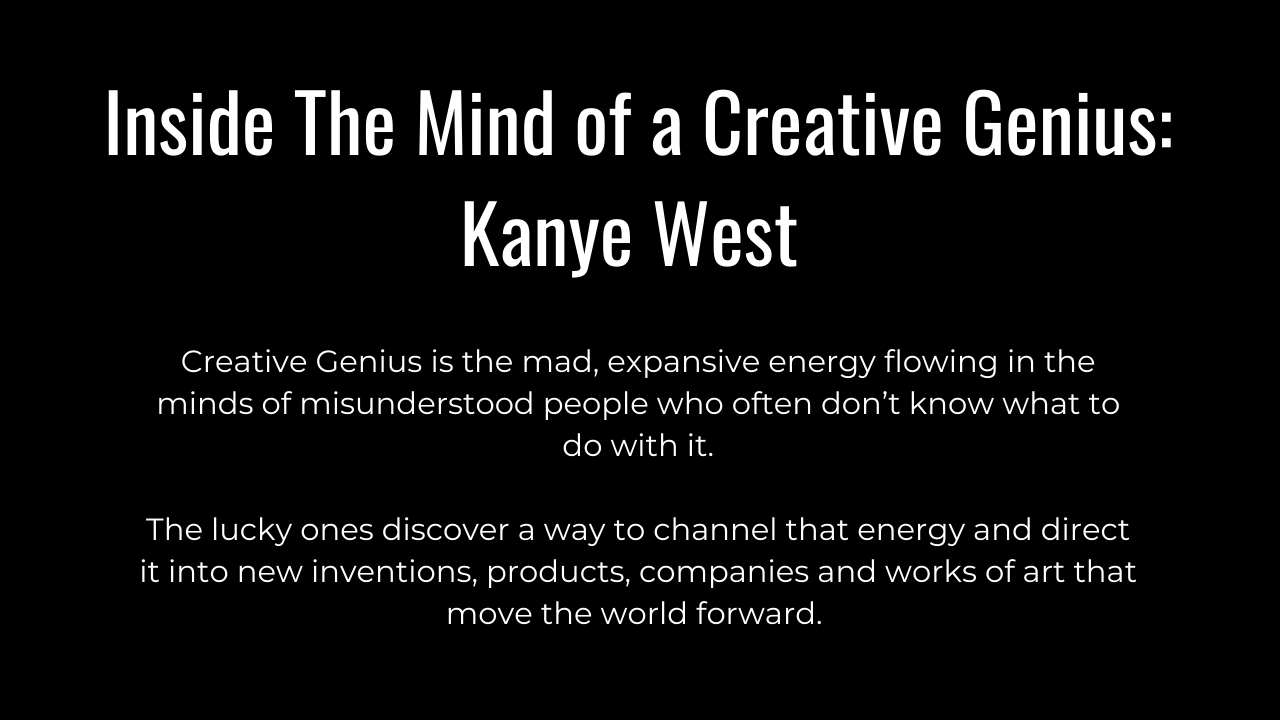

By Reef Karim
September 22, 2021
It’s like driving a Ferrari in a world that wants you in the slow lane.
Creative Genius is the mad, expansive energy flowing in the minds of misunderstood people who often don’t know what to do with it.
The lucky ones discover a way to channel that energy and direct it into new inventions, products, companies and works of art that move the world forward.
It’s this process of harnessing that energy that changes how they are viewed; from misunderstood to genius.
As a human behavior physician specializing in neuroscience and creativity, I’ve worked with some of the greatest geniuses of our time: rock stars, A list actors, world renowned athletes and global thought leaders.
And as a performing artist, I’ve experienced that surge of creative prowess that directs artistic and entrepreneurial endeavors.
As a result, I’ve become very familiar with both the expansive energy and habitual challenges in the mind of a creative genius.
Can creative genius be learned or are you born with it?
The answer is yes.
Your inner journey in life may include a hereditary boost of creative genius, but expansive creative thinking can also be learned.
Can you be highly creative without having mental health problems?
Absolutely.
Being more aware and connected to your creativity requires a sensitivity that can make you more vulnerable to mental health symptoms.
But, there are lots of highly creative people that do not suffer from mental health impairment. In fact, they thrive!
What about Kanye?
Okay, let’s get the disclaimer out of the way.
I don’t know Kanye West, but I do know the mind of the creative genius.
And since Kanye’s life decisions, behavior and artistry have been so highly publicized and criticized, let’s talk a little Kanye.

As Kanye West continues to struggle publicly with reports of bipolar disorder, the way his struggles are reported reveals three important truths: a public lack of understanding of mental health (even though it’s more talked about than ever before), the downside of creative genius (it’s not all inventive and amazing) and the way our society values visibility over credibility.
So let’s talk about these three truths.
Truth #1: A Public Lack of Understanding of Mental Health
When in the throes of an active mental health problem, in this case bipolar disorder, an individual might say or do things that don’t seem quite right. It could be paranoia. It could be grandiosity. It could be highs and lows, mood instability, anxiety. That’s the emotional pain talking. It’s the driving factor dictating what they say and what they do.
People suffering from bipolar disorder, which is a neurochemical condition in the mind, may suffer from racing thoughts, pressured speech, nights without sleeping, mood swings, risky behaviors, deep insecurity, impulsive actions and paranoia.
And they may also have intense surges of creativity.
The real problem, though, is living their lives outside of those bursts of creativity such as navigating interpersonal relationships, communicating effectively, controlling their impulses and managing their emotions. Problems also manifest around maintaining a job, social etiquette and being able to trust people around you (we are witnessing much of this now per reports).
These behaviors, that seem so basic to people who aren’t suffering, are often overlooked, neglected or too painful in people who are suffering with mental health impairment; particularly if an individual is not on their medications, unaware of their condition or not actively engaged in a strong treatment program.
Listen to the way most people describe Kanye’s behavior at face value and how they completely overlook the fact there might be something else going on. And to make it worse, the public (and particularly the media) should know that during times of crisis, stress and uncertainty (the world right now), mental health conditions tend to worsen.
Think about it. We are all feeling the effects of a crisis mindset right now and people who are vulnerable emotionally are in a tough place.
Truth #2 The Power of Creativity and Often Overlooked Downside of Creative Genius
(it’s not all inventive and amazing…)
Tapping into your creative power can completely change your life; it can provide you vision, insight, new ideas, new ways to problem solve and so much more. A creative mind connects concepts and neurons in ways others simply don’t.
A creative artist can envision things that others can’t; can solve problems, build companies, write music, connect the dots, lead a team, activate their originality and integrate the cognitive and creative parts of the mind in ways others aren’t able to or don’t know how to do.
We should all strive to be more creative. Some of it is innate. But you can LEARN to be more creative. You can learn to generate new ideas, problem solving and think out of the box.
Creative genius is high creative output and innovative thinking; so much so that it may come with some potential downsides; starting with erratic or complicated mental health difficulties. Just look at the lives of the few people tagged with the title “creative genius” and you’ll most likely see an erratic personal life. This is primarily connected to the heightened sensitivity and connection to one’s emotional state. It provides great ideas but also can lead you vulnerable.
So what about bipolar disorder and creative genius?

Bipolar disorder is often linked with creativity. And there is some truth to that. But it is also very possible to be uber creative without suffering from mental health difficulties. You may see the world differently but still maintain an ability to be grounded in reality.
Creativity is an incredibly underutilized tool that often goes undiscovered in the lives of many individuals. But creative genius is obvious; its effects are undeniable. The only problem is the potential trade off; the benefits, contribution and art that comes from the mind of a creative genius is often complicated by that individual’s inability to function in a normative setting in the world.
Truth #3 We live in a society that currently favors visibility over credibility.
Our media distribution networks allow people to have platforms (social media, blogging, vlogging, podcasts, talk shows, news, etc.) to say/announce/blast whatever opinions they want regardless of any training, substantial experience on the topic, extensive knowledge, genuine insight, credibility, education or the innate wisdom to responsibly share or back up that opinion.
The end result? A society swimming in information overload and a lack of credibility; lots of noise and opinions, but very little credible expertise, understanding, insight and compassion.
There’s so much noise that we can’t hear the wisdom.
Our experts can help us navigate through crisis, help us achieve clarity, help us better our lives. And without their voice guiding us, we will see more conformity, more fatigue, more anxiety, less originality and more mental health issues. And that’s a huge problem.
And it’s exactly what we’re seeing.
We tend to take people in the public eye at face value and don’t look at them as full spectrum, complicated human beings. What a celebrity or politician or artist does and says — gets analyzed and dissected and overly scrutinized with little investigation into “what’s really going on”.
The misconceptions, stigma and lack of insight associated with mental health difficulties are significant, under-recognized and under-appreciated.
And sometimes those same notable human beings are under the influence of an inner chemical disturbance; and during those vulnerable public moments, we should show more compassion and less sensationalism.
To get inside the mind of a creative genius, one must explore the unconscious, a warehouse of ideas and past traumas. And explore our default network, the connectivity of imagination and ideation in our brain.
We are all capable of creative output. And we are all capable of better understanding the mind of the creative genius.
To creativity, courage and connection,
- Reef
If you know someone who really needs this information, please share this article with them.
